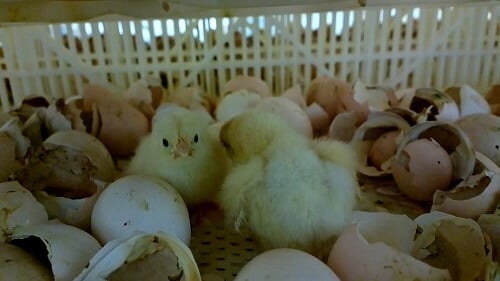What’s the backbone of the poultry industry? Suffering. And few touched by this industry escape unscathed.
Earlier this year, an Oxfam report found that workers at this country’s four largest chicken conglomerates are ignored, ridiculed or even threatened with being fired if they dare to ask for or take “unscheduled” bathroom breaks. Those who are unable to “hold it” are forced to urinate or defecate in place, while working the processing line—a demeaning and disgusting prospect. Some have resorted to wearing diapers while on the job.
Workers take additional hits in the form of ridiculously low wages and exposure to dangerous air conditions that may lead to asthma, bronchitis or other chronic respiratory illnesses. Those who work in slaughterhouses may lose fingertips—or even worse—to the machinery.
The poultry industry also turns a blind eye to the environment. Three of the top 15 U.S. waterway polluters are chicken companies, and poultry producers suck up clean water at an alarming rate. Chicken farms pump harmful bacteria and other pollutants into the air, potentially sickening nearby communities. And ironically, the current industry trend toward organic chicken—which produces smaller animals—exacerbates environmental decay: Raising smaller chickens means that the number of birds has to go up in order to meet demand, which, in turn, means more water wasted and hundreds of thousands of extra tons of manure to cope with (not to mention a larger number of suffering individuals).
In light of its complete disregard for its own workers and even the very air we breathe, it’s no surprise that the poultry industry condemns chickens, too, to widespread suffering. These inquisitive, clever animals are raised in filthy, windowless sheds, crammed in by the thousands, with virtually no opportunity to engage in natural forms of behavior, such as dustbathing and roosting. At slaughter time, they’ll be crammed into open-air trucks in the dead of night and transported through all weather extremes to the slaughterhouse. Some birds will die along the way, succumbing to dehydration, heat exhaustion or freezing temperatures or crushed under the weight of their cagemates.
The survivors will have their legs forcibly jammed into shackles, and as they hang helplessly upside-down, their throats will be cut by a spinning blade. But not all will die immediately: Each year, nearly 1 million birds will still be conscious when they are immersed in scalding-hot water so that their feathers can be removed.
Even at birth, chickens are shown little kindness. A recent PETA exposé of a massive North Carolina hatchery operated by Sanderson Farms, Inc.—also one of the companies cited by Oxfam’s damning report—documented that chicks who hatched later than expected were often left to suffer in barren plastic crates. These hours-old babies—deprived of warmth, comfort and mothering—are seen gasping for air, some too weak to stand or lift their heads. Discarded but still-living chicks were dropped into a giant grinding machine called a macerator—but some fell to the side and were simply left alone to languish and die.
Perhaps what’s most shocking is that in the poultry industry, it’s standard practice for unwanted chicks to be ground up alive, just as it’s standard practice to confine older birds for their entire lives to windowless sheds. None of this everyday suffering is illegal in the many states whose anti-cruelty statutes exempt “normal” factory-farming practices.
Most consumers, though, have no idea that when they buy eggs, chicken, other types of meat or even dairy foods at the grocery store, they are financially supporting institutionalized abuse. Investigations by PETA and other concerned groups into the abuse that occurs out of the public eye are crucial for consumers to understand where their foods come from. But across the country, anti-whistleblower laws (commonly referred to as “ag-gag” laws)—which block people from documenting and exposing cruelty to animals—threaten these vital investigations. Such laws protect abusers, never the abused.
All those chicken fingers, buffalo wings, rotisserie-roasted breasts—every single purchase contributes to suffering. Every single purchase declares your support for the abusers rather than for the abused. Stick up for the abused: Go vegan.
Dan Paden is an associate director in PETA’s Cruelty Investigations Department.





